This post may contain references or links to products from one or more partners of our parent company and/or subsidiaries of our parent company. For more information, visit this page.
Updated December 1, 2020
Looking into the advantages and disadvantages of engineered wood? Starting to get ridiculously overwhelmed trying to understand all the pros and cons of engineered flooring? Never fear! It’s time to stop and take a breath. We’re here to help.
This guide will walk you through all the engineered wood advantages and engineered wood disadvantages you need to know about. Once you know the pros and cons, you’ll be able to decide whether engineered wood is the right type of wood flooring for you!
First of All: What is Engineered Wood?
Let’s start at the beginning. Does engineered wood fall into the category of “hardwood floor alternatives”? No. Engineered hardwood is real wood. It’s just a little different than solid hardwood.
Solid vs. Engineered Wood: What’s the Difference?
While solid wood is made from one piece of wood (no surprise there) engineered wood is made of solid wood plus a super-durable plywood core.
Think of it this way: solid hardwood grew up in a mansion on Millionaire’s Row. Plywood works in a factory on the wrong side of the tracks. These star-crossed lovers, married together, created engineered wood.
With its real hardwood veneer and layered plywood core, engineered wood combines the durability of composite wood with the luxury of solid hardwood.
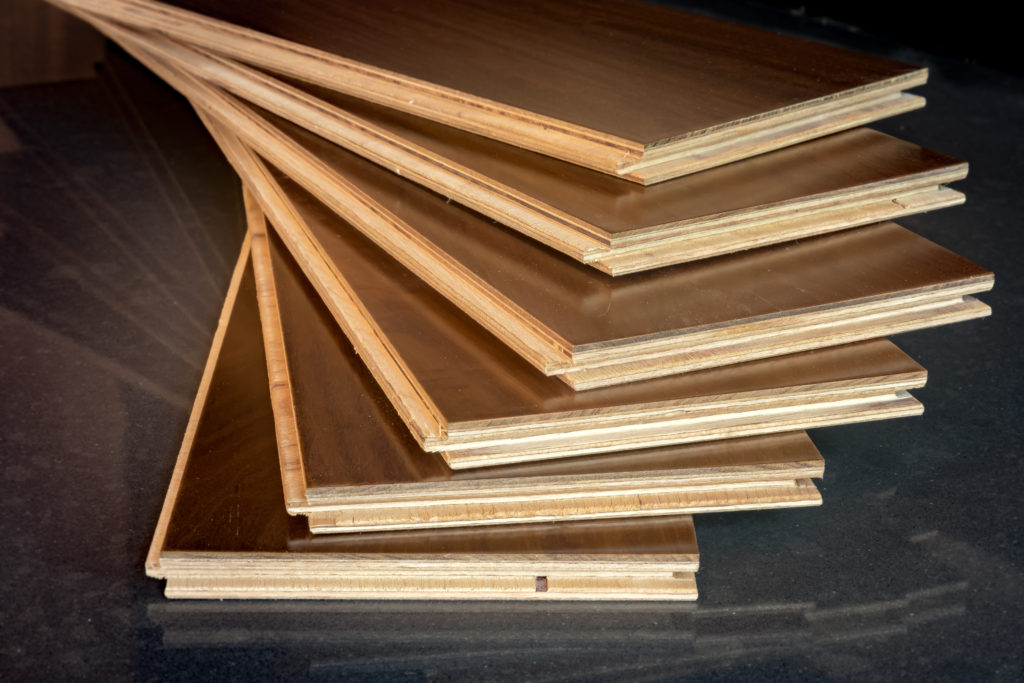
Some people call engineered wood “fake wood flooring”—and we get it. There are a lot of misconceptions!
But the best engineered wood flooring brands use high-quality materials, a thick veneer, and a sturdy core. Meaning engineered options behave almost exactly the same way as solid options.
Plus—these days, almost all of the best hardwood floor brands sell engineered wood, giving you more choices when buying a hardwood floor than ever before.
And once engineered wood is installed, it’s impossible to distinguish it from solid hardwood. You can even use it to make creative wood floor patterns, just like you can with solid wood!
Already sold? Us too. That’s why it’s one of the most popular types of wood flooring! But hold your horses, because there are some important engineered wood disadvantages to keep in mind.
Best Brands of 2024
Engineered Wood Disadvantages
Look, we love engineered wood because it can go where solid hardwood can’t. Plus, it can make exotic woods more affordable. And, it can sometimes make do-it-yourself flooring projects easier.
But don’t run off to your local flooring retailer just yet—there are important questions you need to consider before you start picking out color samples.
Along with the good stuff, there are a number of engineered wood disadvantages, too—and you could be very disappointed down the road if you don’t consider them now. Let’s jump in!
Some Engineered Wood Products Can’t Be Refinished (But That Doesn’t Always Matter)
Many people buy hardwood floors because they can be sanded down and refinished almost indefinitely. Unfortunately, some types of engineered wood can’t be refinished more than once. And some types can’t be refinished at all.
Engineered Wood Can Be Scratched and Dented
Even though engineered wood is durable (engineered products often make our list of the best wood flooring for dogs), it will dent and scratch over time.
That’s just life—especially if you have rowdy kids, naughty pets, or heavy furniture!
Even if you purchase the best engineered wood flooring, engineered wood is still just that—wood! And that means its resistance to scratches, dings, and dents will be determined more by the hardwood species and finish you choose than by anything else.
Thin Veneer Layers Can Reduce Your Floor’s Lifespan
Because of what we just mentioned, you need to choose a thicker veneer if you want to refinish your engineered wood.
Engineered Wood Is Not Waterproof
Both solid and engineered wood are made of natural materials, and will warp and bend if they get soaked. Even the best engineered wood flooring products can’t resist standing water.
Water damage is every homeowner’s nightmare—so if you don’t trust your roof (or if your plumbing is ancient), maybe see how tile vs. wood floors stack up before committing to engineered wood.
That said, engineered wood’s composite construction does make it less susceptible than hardwood to changes in humidity and temperature. Compared to solid wood flooring types, engineered hardwood is a safer bet in moisture-prone areas like kitchens, bathrooms, and basements.
And It Isn’t Entirely Moisture-Proof, Either
Look, we’re not talking about outdoor flooring options here, but there are some areas that benefit from more water-resistant surfaces—bathrooms, kitchens, and basements, for example.
And while engineered wood is more moisture-resistant than solid wood (as we mentioned), it will swell and buckle if it sits in standing moisture for too long.
Translation: if you need some super water-resistant wood flooring, you might want to think outside of the engineered hardwood box. Look into the pros and cons of tile vs. laminate, for instance. These days, many types of floor tiles come in wood-look finishes, and you can even find waterproof laminate options like Mohawk’s RevWood.
If you’re not sold on tile, lots of types of vinyl plank flooring blend realistic wood-look visuals with a completely waterproof construction. There are some disadvantages of vinyl plank flooring, but water-resistance is not one of them.
Low-Quality Engineered Wood Can Off-Gas VOCs
Low-quality engineered wood doesn’t just fail the endurance test—it can also be harmful to your family’s health. Talk about engineered wood disadvantages!
The EPA has found that low-quality engineered wood is sometimes made with glue that contains formaldehyde, a volatile organic compound (VOC) that goes through an off-gassing process once it’s installed in your home.
Thankfully, low-VOC flooring is becoming more and more common. But when you’re buying engineered wood, it’s still something you should look out for—especially if eco-friendly flooring is a priority for you.
Our advice? Get your floors from a local flooring store in your area rather than from a big box store. They specialize in helping you find quality materials and don’t sell risky products.
And Low-Quality Products Can Wear Out Quickly
Remember: not all engineered wood is created equal. Be careful to avoid low-quality products from cheaper producers (*cough*lumberliquidators*cough*), as your initial savings will be lost when your floors wear out before their time.
Start with some quick online research. A little work today saves a lot of trouble later. After all, you don’t want to have to google “how to install hardwood floors” again after only a couple of years!
Plus, Low-Quality Core Construction Is Also an Issue
Speaking of wearing out quickly: if your engineered wood floor is constructed with a low-quality core, it doesn’t matter how thick its wear layer is. It will wear out before its time!
To remedy this issue, you want to look for engineered products that have a thick, high-quality plywood core. Plywood is different from fiberboard or OSB (oriented strand board) and is often more durable.
Try to get products that have 7-9 layers (or “plies”). The best engineered wood cores will have 9+ plies, but these can get pricey.
Engineered and Solid Wood Can Be Similar in Price
While engineered wood can be cheaper than solid wood when it comes to more expensive or exotic wood species, this isn’t always the case.
In fact, when it comes to many types of wood, engineered and solid wood options are extremely similar in price. This is true most often with domestic species like oak and ash.
Think of it this way. One of the big disadvantages of hickory flooring is that it’s more expensive than other domestic hardwoods. So if you buy an engineered hickory floor, it will probably be cheaper than buying a solid hickory floor. And some super-exotic products like ebony flooring can only be purchased as engineered options (if at all).
But if you want oak flooring, the cost of an engineered wood floor will probably be very similar to the cost of a solid wood floor.
Is this a huge engineered wood disadvantage? Perhaps not, but it is worth mentioning.
Engineered Wood Can Fade in the Sun
This isn’t as much an engineered wood disadvantage as much as a general wood floor disadvantage. But it’s still important to know that engineered wood can fade from UV exposure.
There is an easy solution to this problem, though. Ask your local flooring store for products that have UV-resistant coatings, and make sure to keep your floors out of direct sunlight if possible.
And Engineered Wood Is Not Low-Maintenance
If you were hoping that engineered wood would offer a super low-maintenance solution to wood flooring, we’re sorry to be the bearer of bad news—but it isn’t.
In fact, engineered wood requires just as much maintenance as solid wood does, because the top layer is solid wood!
We’re not saying engineered wood requires as much maintenance as cork, for instance (one of the big disadvantages of cork flooring is that it has to be resealed periodically)—but it is definitely more labor-intensive than something like laminate.
After all, what is laminate flooring if not a durable, low-maintenance hardwood floor alternative?
Engineered Wood Advantages
We admit, we’re biased. Even though there are some engineered wood disadvantages, it’s still one of our favorite types of flooring. There are so many advantages to choosing this material—and not just because it’s an easy way to get the look and feel of the best hardwood floors without breaking the bank. Here are some engineered wood advantages:
Engineered Wood Can Save You Money (Especially With Exotic Woods)
If you’re obsessed with the look and luster exotic woods like mahogany or teak, you’re not alone. Exotic hardwoods are a gorgeous choice, but they can get pricey—and fast.
So if you’re considering an exotic wood species like Brazilian Walnut (one of the most durable wood flooring options around), think about getting an engineered product.
Because they use less solid wood, engineered exotic woods often cost less than solid exotic woods. Basically, they can help keep your wood flooring cost within budget without compromising on beauty!
Installation Is Often Quicker, Easier, and Cheaper
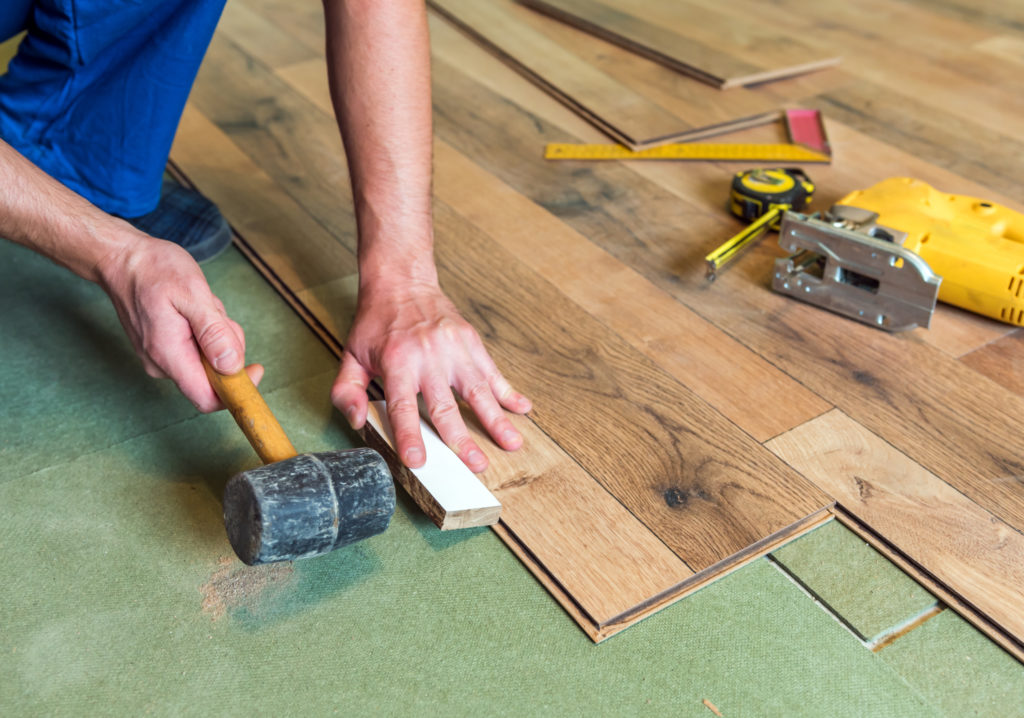
Who wants to spend a week tiptoeing across an unfinished wood floor, ducking workers, and drying glue spots? Not us! Home renovations can drag on, turning a fun transformation into a frustrating mess.
One of the biggest advantages of engineered wood flooring is how quickly and easily it can be installed if you purchase it as a click-together flooring system.
Click-together flooring is exactly what it sounds like—flooring boards pre-made to snap together in a jiff. These systems can be installed over existing flooring as “floating floors” (no need to break out the claw hammer), and don’t need to be nailed or glued down.
This easy installation can make the cost to install engineered hardwood floors a lot cheaper, but make sure to talk it out with your contractor for specifics. They’ll probably thank you for making it easy on them as well!
Oh, and forget what you’ve heard about the disadvantages of floating floors. If installed correctly, click-together engineered wood can be just as durable as nail-down solid wood.
Engineered Wood Is More DIY-Friendly
As we mentioned, click-together flooring doesn’t need to be attached to a subfloor (and “what is subflooring”, you ask?).
This doesn’t just make it easier and cheaper to install for professionals—it also makes it some of the easiest flooring to install for DIY-ers, too!
So whether you’re thinking about redoing your wood floors, putting in new surfaces on the cheap, or just looking into the cost to replace carpet with hardwood, remember—there are some engineered wood disadvantages, but ease of installation is not one of them.
There Are Tons of Unusual-But-Amazing Engineered Products
Want all the benefits of an engineered wood floor but with a little added oomph? We hear you. Luckily, tons of wood-adjacent products like bamboo and cork also come as engineered options.
Have you looked into the pros and cons of cork flooring? You should! What about bamboo flooring vs. laminate? Definitely check it out.
Whatever surfaces you want, from the best cork flooring to the best bamboo flooring, you can find them as easy-to-install engineered options.
Don’t believe us? Check out the pros and cons of engineered bamboo flooring. They’ll blow you away!
Conclusion: There Are Definitely Some Engineered Wood Disadvantages, but They’re Pretty Minor
Yes, there are some disadvantages of engineered hardwood, even though still one of our favorite types of wood flooring. But in comparison to the enormous upside engineered wood offers, these disadvantages are minor.
Just make sure you carefully consider your own specific circumstances before you buy. While engineered wood might work well for sunroom flooring in San Diego, it won’t work as well for mudroom flooring in Montauk. As always, an in-depth conversation with the professionals at your local flooring retailer is the best place to start!
Ready for more info? Read on!
- A Guide to Peel-and-Stick Carpet Tiles (& 9 Reasons They’re Amazing)
- Carpet vs. Laminate: Choosing the Best Floor for You
- Pergo Reviews 2020: What Buyers are Saying
- Snap-Together Tile Flooring: A Total Game-Changer
- How to Install Carpet Tiles in 7 Easy Steps
- Is the Cork Flooring Lowe’s Sells Actually Worth Buying?
- Can You Bleach Wooden Floors? Yes! Here’s How.
- Pine Flooring: The Pros and Cons
About The Author

Rose Mraz
July 13, 2020
Rose's career has taken her from small-town teacher to mixologist at several award-winning NYC cocktail bars (and everywhere in between). These days, she plies her craft as an SEO writer specializing in the confluence of wellness, politics, and the service industry.
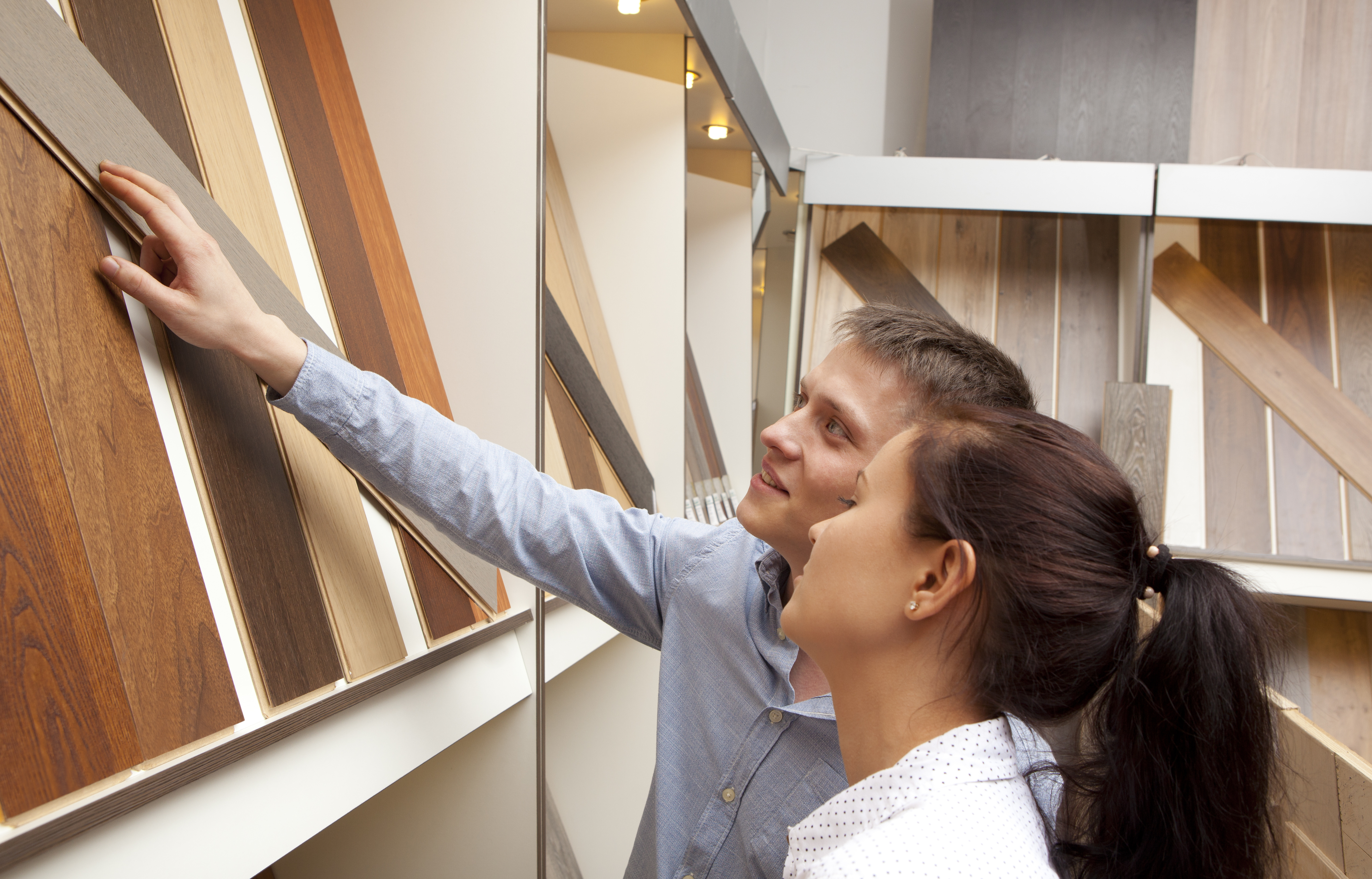
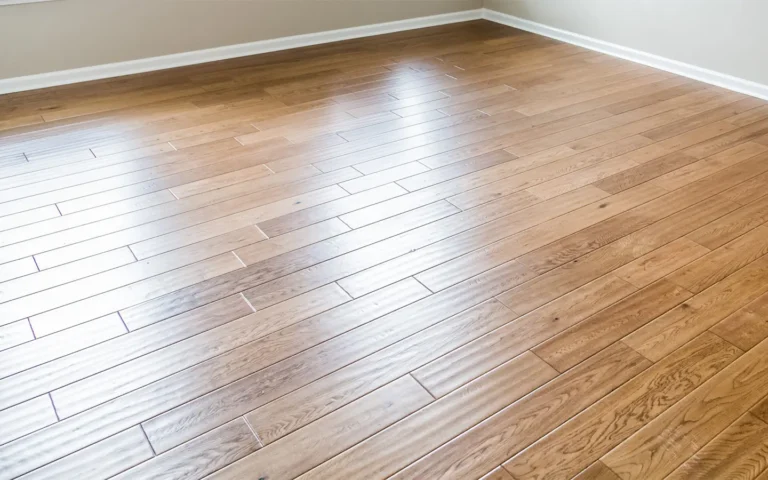

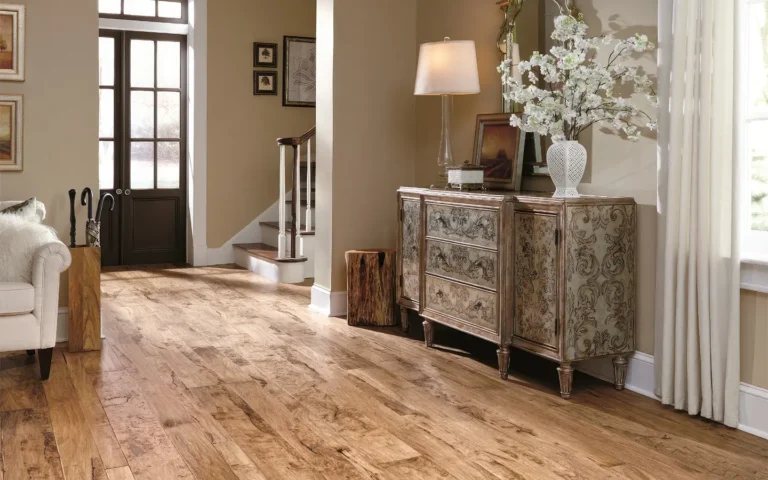


10 comments
Daina Allen
My home has Parquet wood flooring and scratches made by small, sharp objects make the floor look very bad. And after reading your article, I’m quite convinced that engineered wood flooring would be the best option for my house. Thanks for sharing!
Bo Arnold
Thanks for reading, Daina! Engineered wood floors are a great option—glad we could help.
Flonnie Wullenwaber
I am glad I read your article before calling the wood floor company who installed our engineering wood floors to file a complaint. We purchased a model home 3 years ago that came with engineering flooring and I’ve noticed it dents HORRIBLY, especially where the chairs are under our kitchen and dining room tables, furniture where we sit, underneath our couch where are furniture feet sit, underneath end tables, and the list goes on. The wood is so soft if you drop anything heavy on it, the flooring will show indentions. It also chips in hunks if something is dropped on in. We do not have children, so I can’t blame it on them. it is dark walnut color, so that makes its show even worse. Maybe the builder put a low-quality floor in. We were planning to rip the carpet up from our bedrooms and install our current engineering flooring so it will flow throughout the house, but I cringe to have to do it. Tried to find LVP to match, but with no success. We recently just added a four-seasons room to our home and we used LVP and I am sold on it. Holds up much better and looks great as well. We live on the coast and we’ve had solid wood, but it cupped from the humidity and moisture, now engineered hardwood and it dents and scratches terribly, so when its time to replace I will NOT use it.
Again, thanks for your article. I learned a lot.
Masonry Contractor Bensalem
Very interesting! Learn something new every day. Didn’t know engineered wood flooring existed until I read your article!
Hardwood Flooring Salt Lake City
I was thinking of installing the hardwood floors in my office but after speaking to a well known hardwood flooring Salt Lake City Company they did an inspection of my office and asked me a few questions. They advised me to go for engineered wood flooring. So, I just wanted to check some facts and this post has really helped me clear my doubts. Temperature changes and humidity is one big issue in July because humidity at that time is 70 percent and engineered wood flooring is a good option. I will ask the flooring company to offer me a thick veneer because it can be refinished which I will need after a certain amount of years. The post has given me a lot of clarity on what I should opt and what I shouldn’t. Thanks.
Samuel Greenberg
Hi there,
We’re so, so happy we could help! Buying a floor is a really big undertaking, and we find a lot of companies tend to forget that. It really means a lot that we were able to help clear some things up for you as far as solid vs. engineered wood is concerned. If there’s anything else we can help you with at all, please don’t hesitate to shoot a message to our team of flooring experts. They can give you 1-on-1 help with anything and everything flooring-related.
Thanks so much for reading and commenting, and again, really happy we could help!
–Samuel
PS: Good luck with your flooring install and let us know how it goes!
Rebecca Gardner
It stood out to me when you said that engineered wood can get us affordable flooring without sacrificing beauty. My husband and I are planning some changes to the ground floor of our home next year and really want to make sure we stick to our budget. Thanks for sharing this article so I can do some further research about engineered flooring and see if it’d be a good option for us!
Samuel Greenberg
Hi Rebecca,
It’s our absolute pleasure and best of luck with your ground-floor renovation! If there’s anything we can do to help, please don’t hesitate to reach out to our expert team—they can give you personalized help with your floor-buying journey every step of the way.
Thanks for reading and commenting!
–Samuel
Keith
I’m a huge fan of solid hardwood, but I’m starting to come across engineered flooring too. It’s starting to really pique my interest, seeming like there’s a few situations where it can be a better choice. One example I’ve seen is it’s ease of installation over a subfloor of concrete compared to solid hardwood. It also seems like there’s a much higher tolerance of humidity for engineered floors, so you don’t have to worry about much cupping or movement. Finally, there’s a good bit of price control with engineered wood. Essentially, you can expect the price to increase or decrease correlating with the number of layers in the wood. What do you think Rose? Do you think it’s truly more of a preference situation between deciding which is best? That seems to be where I’m ending up.
Samuel Greenberg
Hi Keith,
Samuel (Content Manager) jumping in for Rose here. You’re right on the money that engineered wood flooring can be the better option for a number of applications (like over a concrete subfloor or in a humid environment), and we’re seeing more and more homeowners go with engineered products for exactly that reason. This is especially true in places like Florida, where the moisture in the air can really do a number on solid hardwood.
To that end, we couldn’t agree more—it truly seems to be a situation-by-situation preference. Some floor buyers we talk to are swayed by the price difference when it comes to exotic species; for others, it’s the utility of engineered vs. solid wood. Really, all the best hardwood floor brands make such amazing products in both solid and engineered varieties, we’d be hard-pressed to say “x is better than y” just as you pointed out.
Anyway, thanks so much for reading and for reaching out—really appreciate what you had to say!
–Samuel